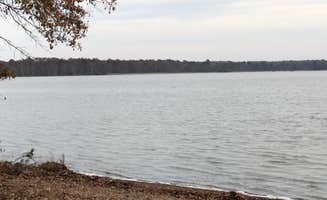Dispersed camping near Ashland, Virginia offers primitive options primarily on several Wildlife Management Areas (WMAs) within driving distance. These locations require minimal preparation as campers won't find standard amenities like running water, electricity, or waste disposal. The coastal tidewater region creates a distinctive camping environment with seasonal considerations that affect accessibility and comfort, particularly during summer months when humidity peaks and winter when temperatures can drop below freezing.
What to do
Fishing opportunities: At Chickahominy Wildlife Management Area, visitors can set up camp directly adjacent to prime fishing spots. One camper notes: "I arrived with a small (18') trailer and put it within 5' of the water. Since it's a WMA you can set up anywhere but this place has about 15 cleared areas any one of which I would have been happy with."
Wildlife photography: The remote areas throughout the WMAs provide excellent opportunities for photographing native birds and animals. Many cleared spots at Chickahominy WMA offer unobstructed views of the water where wildlife congregates, especially during early morning hours.
Hiking exploration: At Ware Creek Wildlife Management Area, trails wind through coastal forest terrain. One visitor mentioned: "Got here late as the sun was going down. Camped in the RAV4. Will explore the area in the morning." The area features several unmarked paths that require navigation skills.
What campers like
Waterfront access: Campers consistently praise the ability to camp within feet of the water at Eagle Nest Lookout. As one reviewer stated: "Car camped here 5 feet from the water. There is a large shoreline area to Car camp and right up the hill is a nice tent site as well overlooking the river."
Elevated camping spots: Several dispersed sites offer higher ground options with better views. A camper at Eagle Nest Lookout described: "There is a beaten narrow path that leads from the end of the road up to a small knoll. At the top is an area about 20 feet wide covered in mature trees with a view of the James River."
Affordability: The permit system makes these sites cost-effective compared to developed campgrounds. As one visitor noted about Chickahominy WMA: "Camping here is free but there is a $4 daily use fee to be in the WMA that you can pay via phone, website or app."
What you should know
Permit requirements: Virginia residents with fishing or hunting licenses receive 14 days of complementary camping at these WMAs. Non-residents must purchase permits. A camper at Chickahominy confirmed: "Basic parking spot in quite location. Weekends some hunters and shooting range close by in other side. It's 2 parking side by water and some other ones on the way while driving. No amenities but nice camping experience and you can purchase $4 daily pass or if Virginia residents free 14 days camping complementary."
Noise considerations: Shooting ranges operate near several WMAs. According to one Eagle Nest Lookout camper: "Winter Car Camping at Eagle Nest Lookout can be affected by other users. The proximity to water attracts fishermen using various methods: "If you are fishing, they pulled up a 17 pounder and a 25 pounder using a drone to take their lure easy out."
Trash issues: Pack-in, pack-out principles are not always followed. Several sites require cleaning before setting up: "There was quite a bit of trash dispersed in this area in which we picked up. Apparently this is a well used fishing location seen by the debris that was left."
Tips for camping with families
Site selection: Choose spots away from boat ramps where traffic is higher. At Eagle Nest Lookout, a visitor observed: "If your looking for complete privacy, I'd recommend trying one of the other sites sprinkled around the area. Definitely a busy little spot but we ended up having the place to ourselves once all the people Fishing left."
Noise scheduling: Plan activities around shooting range hours. Most ranges close by early evening, making night hours quieter for families with children trying to sleep.
Safety precautions: Areas without designated swimming spots require close supervision of children near water. The riverbanks can be steep and currents unpredictable in certain sections.
Tips from RVers
Small trailer access: Most WMA dispersed sites accommodate smaller rigs only. Large motorhomes will find few suitable locations: "I arrived with a small (18') trailer and put it within 5' of the water." The unimproved access roads limit larger vehicle maneuverability.
Level parking challenges: Many waterfront sites have uneven terrain requiring leveling blocks. Look for the higher ground options that typically offer more level surfaces for parking and setting up.
Generator etiquette: If using a generator, respect quiet hours. One camper complained: "To add insult to injury this group ran their generators up until 4:30 am. Very uncool and inconsiderate." The lack of designated quiet hours makes self-regulation important.


